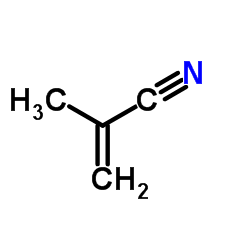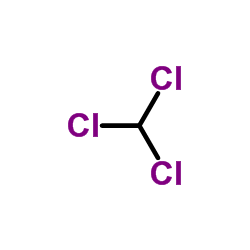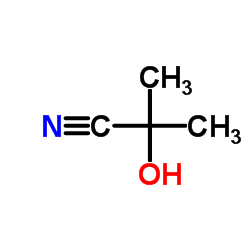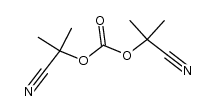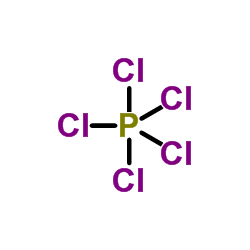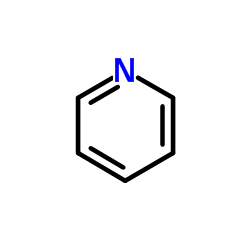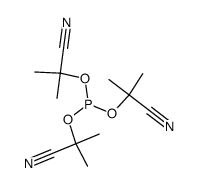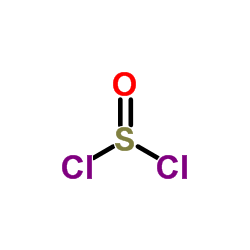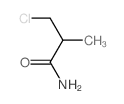7659-45-2
| Name | 3-chloro-2-methylpropanenitrile |
|---|---|
| Synonyms |
3-Chlor-2-methyl-propannitril
EINECS 231-624-3 3-chloro-2-methyl-propanenitrile MFCD00001874 3-Chloro-2-methylpropionitrile |
| Density | 1.078 g/mL at 25ºC(lit.) |
|---|---|
| Boiling Point | 60ºC15 mm Hg(lit.) |
| Molecular Formula | C4H6ClN |
| Molecular Weight | 103.55000 |
| Flash Point | 142 °F |
| Exact Mass | 103.01900 |
| PSA | 23.79000 |
| LogP | 1.38488 |
| Index of Refraction | n20/D 1.434(lit.) |
Synonym: Section 2 - COMPOSITION, INFORMATION ON INGREDIENTS
Risk Phrases: 20/21/22 Section 3 - HAZARDS IDENTIFICATION EMERGENCY OVERVIEW
Harmful by inhalation, in contact with skin and if swallowed. Potential Health Effects Eye: May cause eye irritation. Lachrymator (substance which increases the flow of tears). Skin: May cause skin irritation. Harmful if absorbed through the skin. Ingestion: Harmful if swallowed. May cause irritation of the digestive tract. Inhalation: Harmful if inhaled. May cause respiratory tract irritation. Chronic: Effects may be delayed. Section 4 - FIRST AID MEASURES Eyes: Flush eyes with plenty of water for at least 15 minutes, occasionally lifting the upper and lower eyelids. Get medical aid. Skin: Get medical aid. Flush skin with plenty of water for at least 15 minutes while removing contaminated clothing and shoes. Ingestion: Never give anything by mouth to an unconscious person. Get medical aid. Do NOT induce vomiting. If conscious and alert, rinse mouth and drink 2-4 cupfuls of milk or water. Inhalation: Remove from exposure and move to fresh air immediately. If not breathing, give artificial respiration. If breathing is difficult, give oxygen. Get medical aid. Notes to Physician: Section 5 - FIRE FIGHTING MEASURES General Information: As in any fire, wear a self-contained breathing apparatus in pressure-demand, MSHA/NIOSH (approved or equivalent), and full protective gear. Use water spray to keep fire-exposed containers cool. Combustible liquid. Vapors may be heavier than air. They can spread along the ground and collect in low or confined areas. Containers may explode when heated. Extinguishing Media: Use water spray, dry chemical, carbon dioxide, or chemical foam. Section 6 - ACCIDENTAL RELEASE MEASURES General Information: Use proper personal protective equipment as indicated in Section 8. Spills/Leaks: Clean up spills immediately, observing precautions in the Protective Equipment section. Cover with sand, dry lime or soda ash and place in a closed container for disposal. Remove all sources of ignition. Use a spark-proof tool. Provide ventilation. Section 7 - HANDLING and STORAGE Handling: Wash thoroughly after handling. Use only in a well-ventilated area. Use with adequate ventilation. Avoid contact with eyes, skin, and clothing. Empty containers retain product residue, (liquid and/or vapor), and can be dangerous. Keep container tightly closed. Keep away from heat, sparks and flame. Avoid ingestion and inhalation. Do not pressurize, cut, weld, braze, solder, drill, grind, or expose empty containers to heat, sparks or open flames. Storage: Keep away from heat, sparks, and flame. Keep away from sources of ignition. Store in a tightly closed container. Store in a cool, dry, well-ventilated area away from incompatible substances. Section 8 - EXPOSURE CONTROLS, PERSONAL PROTECTION Engineering Controls: Facilities storing or utilizing this material should be equipped with an eyewash facility and a safety shower. Use adequate ventilation to keep airborne concentrations low. Exposure Limits CAS# 7659-45-2: Personal Protective Equipment Eyes: Wear appropriate protective eyeglasses or chemical safety goggles as described by OSHA's eye and face protection regulations in 29 CFR 1910.133 or European Standard EN166. Skin: Wear appropriate protective gloves to prevent skin exposure. Clothing: Wear appropriate protective clothing to prevent skin exposure. Respirators: A respiratory protection program that meets OSHA's 29 CFR 1910.134 and ANSI Z88.2 requirements or European Standard EN 149 must be followed whenever workplace conditions warrant respirator use. Section 9 - PHYSICAL AND CHEMICAL PROPERTIES Physical State: Liquid Color: colorless Odor: Not available. pH: Not available. Vapor Pressure: 40 mbar @20 deg C Viscosity: Not available. Boiling Point: 60 deg C @15mmHg Freezing/Melting Point: Not available. Autoignition Temperature: Not available. Flash Point: 61 deg C ( 141.80 deg F) Explosion Limits, lower: Not available. Explosion Limits, upper: Not available. Decomposition Temperature: Solubility in water: Specific Gravity/Density: 1.070 Molecular Formula: C4H6ClN Molecular Weight: 103.55 Section 10 - STABILITY AND REACTIVITY Chemical Stability: Not currently available. Conditions to Avoid: Incompatible materials. Incompatibilities with Other Materials: Strong oxidizing agents, strong bases. Hazardous Decomposition Products: Hydrogen chloride, nitrogen oxides, carbon monoxide, carbon dioxide. Hazardous Polymerization: Has not been reported. Section 11 - TOXICOLOGICAL INFORMATION RTECS#: CAS# 7659-45-2 unlisted. LD50/LC50: Not available. Carcinogenicity: 3-chloro-2-methylpropionitrile - Not listed by ACGIH, IARC, or NTP. Section 12 - ECOLOGICAL INFORMATION Other No information available. Section 13 - DISPOSAL CONSIDERATIONS Dispose of in a manner consistent with federal, state, and local regulations. Section 14 - TRANSPORT INFORMATION IATA No information available. IMO No information available. RID/ADR No information available. Section 15 - REGULATORY INFORMATION European/International Regulations European Labeling in Accordance with EC Directives Hazard Symbols: XN Risk Phrases: R 20/21/22 Harmful by inhalation, in contact with skin and if swallowed. Safety Phrases: S 23 Do not inhale gas/fumes/vapour/spray. WGK (Water Danger/Protection) CAS# 7659-45-2: No information available. Canada None of the chemicals in this product are listed on the DSL/NDSL list. CAS# 7659-45-2 is not listed on Canada's Ingredient Disclosure List. US FEDERAL TSCA CAS# 7659-45-2 is not listed on the TSCA inventory. It is for research and development use only. SECTION 16 - ADDITIONAL INFORMATION N/A |
| Symbol |

GHS07 |
|---|---|
| Signal Word | Warning |
| Hazard Statements | H302 + H312 + H332 |
| Precautionary Statements | P280 |
| Personal Protective Equipment | Eyeshields;Faceshields;full-face respirator (US);Gloves;multi-purpose combination respirator cartridge (US);type ABEK (EN14387) respirator filter |
| Hazard Codes | Xn |
| Risk Phrases | 20/21/22 |
| Safety Phrases | 16-26-27-36/37/39 |
| RIDADR | UN 3276 6.1/PG 3 |
|
~% 
7659-45-2 |
| Literature: Stevens Journal of the American Chemical Society, 1948 , vol. 70, p. 165,167 |
|
~45% 
7659-45-2
Detail
|
| Literature: Nazran, Avtar S.; Warkentin, John Journal of the American Chemical Society, 1981 , vol. 103, # 1 p. 236 - 237 |
|
~% 
7659-45-2 |
| Literature: Ritchie Journal of the Chemical Society, 1935 , p. 1059 |
|
~% 
7659-45-2 |
| Literature: I.G.Farbenind. Patent: US2174756 , 1938 ; |
|
~% 
7659-45-2 |
| Literature: Stevens Journal of the American Chemical Society, 1948 , vol. 70, p. 165,167 |
|
~% 
7659-45-2
Detail
|
| Literature: Ritchie Journal of the Chemical Society, 1935 , p. 1059 Show Details Imp.Chem.Ind. Patent: US2183357 , 1934 ; Full Text Show Details Imp.Chem.Ind. Patent: GB424885 , 1933 ; Full Text Show Details Imp.Chem.Ind. Patent: DE657377 , 1934 ; Full Text Show Details Imp.Chem.Ind. Patent: US2265814 , 1939 ; Fortschr. Teerfarbenfabr. Verw. Industriezweige, vol. 24, p. 87 |
|
~% 
7659-45-2 |
| Literature: Rohm and Haas Patent: US2460788 , 1947 ; |
|
~% 
7659-45-2 |
| Literature: Roehm and Haas Patent: US2210320 , 1938 ; |
| Precursor 9 | |
|---|---|
| DownStream 3 | |
